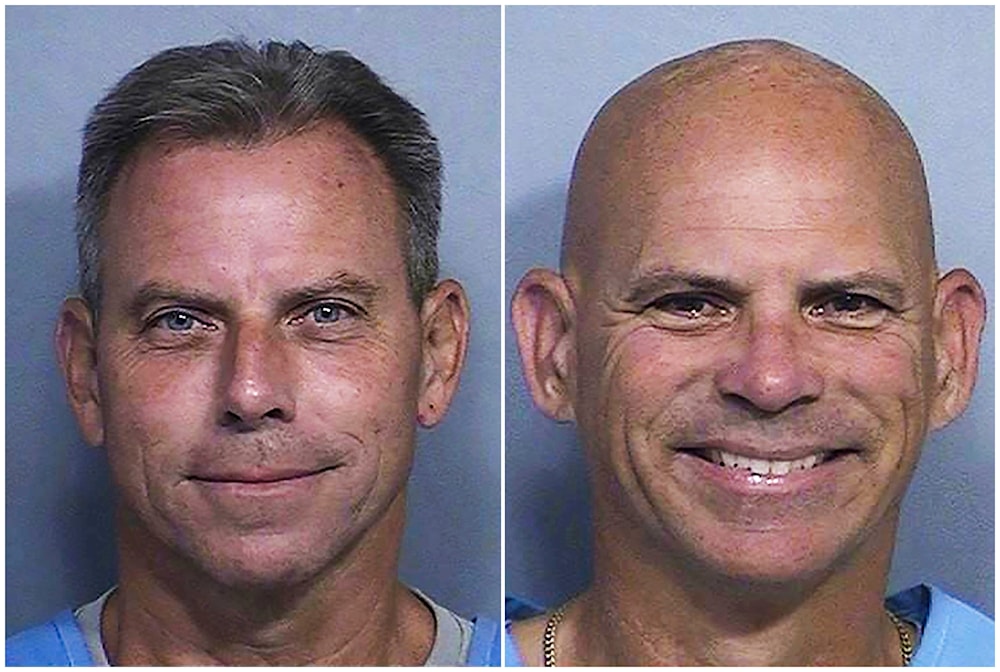Infamous Menendez Brothers eligible for parole after resentencing
After 35 years behind bars, Erik and Lyle Menendez are now eligible for parole under California’s youthful offender law, with supporters citing rehabilitation and a history of abuse, while prosecutors remain divided.
-

This combination of two booking photos provided by the California Department of Corrections shows Erik Menendez, left, and Lyle Menendez. (California Dept. of Corrections via AP, File)
A California judge has ruled that Erik and Lyle Menendez, convicted in 1989 for the murder of their parents in their Beverly Hills home, are now eligible for parole after serving 35 years in prison. The decision came under California's youthful offender law, which allows those who committed crimes under the age of 26 to be reconsidered for parole.
Judge Michael Jesic reduced the brothers' life sentences without the possibility of parole to 50 years to life. Though this does not guarantee release, it makes the Menendez brothers eligible for parole consideration. Their lawyers stated the brothers are now immediately eligible, but they will remain incarcerated until the state parole board makes a final decision.
"I'm not saying they should be released; it's not for me to decide," Jesic said. "I do believe they've done enough in the past 35 years, that they should get that chance."
Now aged 54 and 57, Erik and Lyle Menendez appeared via livestream from a San Diego prison. They showed minimal reaction throughout the hearing but smiled briefly when a cousin mentioned Erik's academic success in prison.
The hearing featured testimonies from several relatives, a retired judge, and a former inmate, all speaking in support of reducing the brothers' sentences. The defense emphasized the brothers' remorse and transformation during incarceration. Diane Hernandez, a cousin, shared that Erik had received A+ grades in his recent college courses.
Family members and former inmates voice support
Anamaria Baralt, another cousin, testified that the brothers had shown consistent remorse and were universally forgiven by the family. "We all, on both sides of the family, believe that 35 years is enough," she stated.
Tamara Goodell, also a cousin, recalled introducing her 13-year-old son to the brothers in prison and emphasized their potential to contribute positively to society if released.
Former prisoner Anerae Brown became emotional as he described the support he received from Erik and Lyle while incarcerated. He credited them with helping him turn his life around and referred to their rehabilitation initiatives as "Menendez University."
The brothers were convicted of first-degree murder and sentenced to life without parole for killing their parents, José and Kitty Menendez. Their defense argued they acted out of fear due to years of sexual, psychological, and physical abuse. Prosecutors described them as wealthy young men motivated by inheritance.
Over the years, the Menendez brothers have pursued multiple legal avenues, including petitions for clemency and motions for a new trial based on newly surfaced evidence of abuse. Their resentencing hearings had been delayed since January due to wildfires and legal disputes.
DA’s office shifts position under new leadership
Former Los Angeles County District Attorney George Gascon supported resentencing, citing modern understanding of abuse and the brothers' rehabilitation. Current DA Nathan Hochman opposed the move, arguing they had not taken full responsibility and that abuse claims were unsubstantiated.
Despite the DA's opposition, Judge Jesic allowed the resentencing process to move forward. Lyle Menendez addressed the court directly: "I killed my mom and dad. I make no excuses and also no justification. The impact of my violent actions on my family ... is unfathomable."
Though resentenced, the Menendez brothers are not guaranteed release. The state parole board will evaluate their eligibility.
Their case, which has drawn renewed public interest, will now hinge on whether their decades of rehabilitation and the circumstances of their conviction justify parole.

 4 Min Read
4 Min Read










